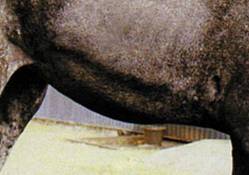Information provided by Dr. Amanda House, Veterinarian, UF Large Animal Internal Medicine, Assistant Professor, DACVIM, Equine Extension Specialist, Director of Equine Research Programs, and Course Director of the Practice-Based Equine Clerkship Program
What is recurrent airway obstruction (RAO) in the horse?
RAO, also known as heaves, broken wind, and chronic airway reactivity, is a common respiratory disease of horses characterized by airway narrowing (bronchoconstriction), mucus production, and bronchospasm.
What are common clinical signs of RAO?
- Chronic cough
- Nasal discharge
- Exercise intolerance
- Respiratory difficulty
- A “heave line” that can be seen along the bottom edge of the ribs
- Weight loss
- Anorexia
- Exercise intolerance
What are the types of RAO?
- Barn-associated type – This is often seen in stalled horses fed hay.
- Summer pasture-associated obstructive pulmonary diseases (SPAOPD, also called summer heaves and pasture-associated heaves) – This is seen more commonly in horses living on pasture in the Southeast.
What causes RAO?
Most evidence suggests that RAO is the result of the lung’s hypersensitivity to inhaled antigens, although multiple theories exist regarding exactly why it occurs. RAO is similar to asthma in people, and has allergic and inflammatory components. The most common allergic triggers for RAO are mold, organic dust, and endotoxin present in hay and straw.
How can I prevent RAO in my horses?
RAO is a chronic disease that will require life-long management changes for the horse. Unfortunately, it is not typically a disease that can be treated for a short time and resolved forever. Many horses with mild to moderate disease can be successfully managed with environmental and dietary changes alone, without additional drug therapy. The most common triggers for RAO are organic dusts, mold, and exdotoxin present in hay and straw. Round bale hay is high in endotoxin and organic dust content, and the presence of round bale hay is a potential cause of treatment failure in horses on pasture.
What if I think my horse has RAO?
If you believe your horse has RAO, call your veterinarian or the UF Large Animal Hospital veterinarians at (352) 392-2229 and visit our Contact Us page for more information.





